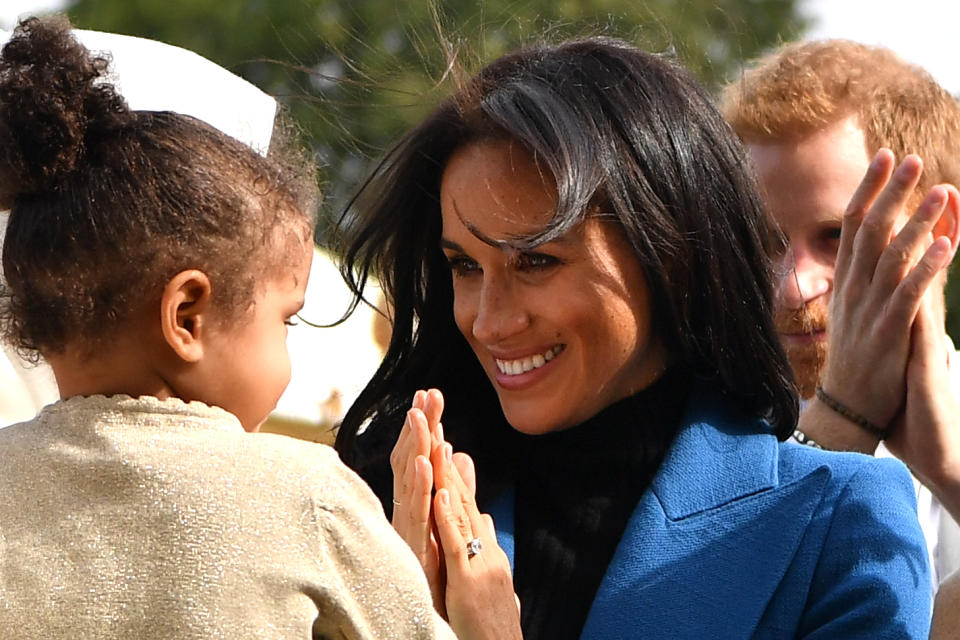Meghan Markle is technically having a 'geriatric pregnancy' — here are the health risks
- Oops!Something went wrong.Please try again later.
Putting an end to months of rumors, Prince Harry and Meghan Markle announced they are, indeed, expecting their first child — a baby due in the spring. The Duchess of Sussex is said to be in good health, but having celebrated her 37th birthday in August, her pregnancy announcement means she will technically be classified as an “older mom.”
It may sound bizarre, but women over the age of 35 are considered to have a “geriatric pregnancy.”
But Meghan certainly is not alone. Over the past two decades, increasing numbers of women have had babies when older than 35. According to figures from the Office for National Statistics, 54 percent of moms in England and Wales are now 30 and over. In fact, as with Meghan, about one in five women is 35 or older when she gives birth.

But while being a so-called older mother certainly isn’t uncommon, the Royal College of Obstetricians and Gynaecologists recently highlighted that there are greater health risks associated with later pregnancy.
“Pregnancy in older age is associated with higher risk of miscarriage,” says Narendra Pisal, consultant gynecologist at London Gynaecology. “This is possibly because of higher chance of chromosomal problems in embryo as the eggs get older.”
“There is also a higher chance of having a baby with Down syndrome,” he continues. “At 35, this is one in 250 and increases to one in 100 by 40 years of age. By 45, risk of miscarriage is nearly 50 percent and chance of a Down syndrome baby is greater than 2 percent. A noninvasive prenatal test is a blood test for a mother to look at the baby’s chromosomes and can be done from 10 weeks of gestation.”
Then there’s the pregnancy-related complications that increase with age, such as preeclampsia, gestational diabetes, low-lying placenta, placental abruption, and growth problems for babies.
“There is also a higher chance of difficult labor and intervention [due to the medical factors above] such as induction of labor or cesarean section,” says Pisal.

But though there are clearly some risks associated with being a little late to join the parenting party, according to some experts, scary headlines often blow those risks out of proportion.
“Anything that is a little unusual in birth is immediately given the high-risk label,” says Katharine Graves, a prenatal education expert and founder of KG Hypnobirthing.
“For older mothers overall, there are slightly higher pregnancy risks — when we are 40, we have had 20 more years to abuse our bodies than when we are 20. But if an older mother is completely healthy and has had a healthy pregnancy and no conditions to be concerned about, she is no more high-risk than a younger woman,” she adds.
The U.K.’s National Health Service (NHS) also stresses that older pregnant women should not be “overly concerned.”
There may be more screening for certain risks, and older pregnant women should make sure their health is in the best condition, as all pregnant women should. “Many women who become pregnant in their late 30s and early 40s have perfectly healthy pregnancies and babies,” the NHS site reads.
However, Meghan certainly won’t be the oldest royal to give birth.
In fact, the queen was an even older mother than her granddaughter-in-law might be, having given birth to Prince Edward, Earl of Wessex, a mere five weeks before she turned 38.
Queen Elizabeth II’s youngest daughter-in-law was classified as a mature mother too. Sophie, Countess of Wessex, was two months short of her 39th birthday when she had her first child, Lady Louise, and just a month short of her 43rd birthday when she delivered her second, James.
And having Prince Louis when she was 36, Meghan’s sister-in-law, the Duchess of Cambridge, knows all about being pregnant and giving birth in your mid- to late 30s.
Read more from Yahoo Lifestyle:
Pregnant Meghan Markle won’t change royal tour travel plans despite Zika warning
Meghan’s Mom, Doria Ragland, Had the Sweetest Reaction to the Royal Baby News
Follow us on Instagram, Facebook, and Twitter for nonstop inspiration delivered fresh to your feed, every day.


